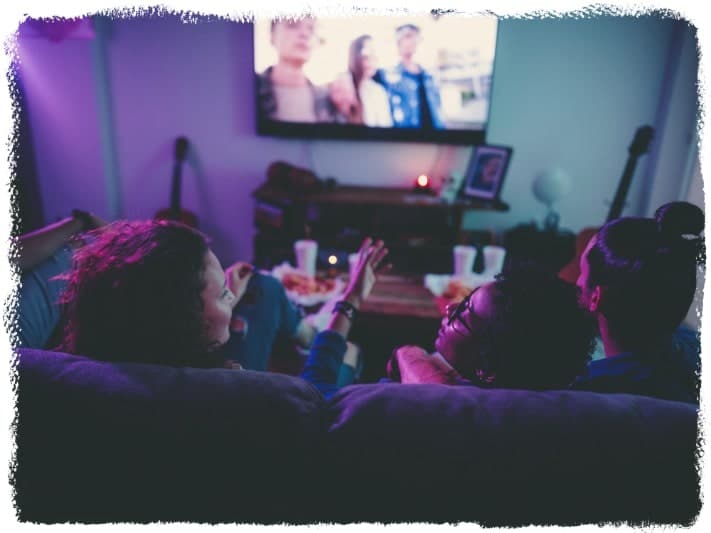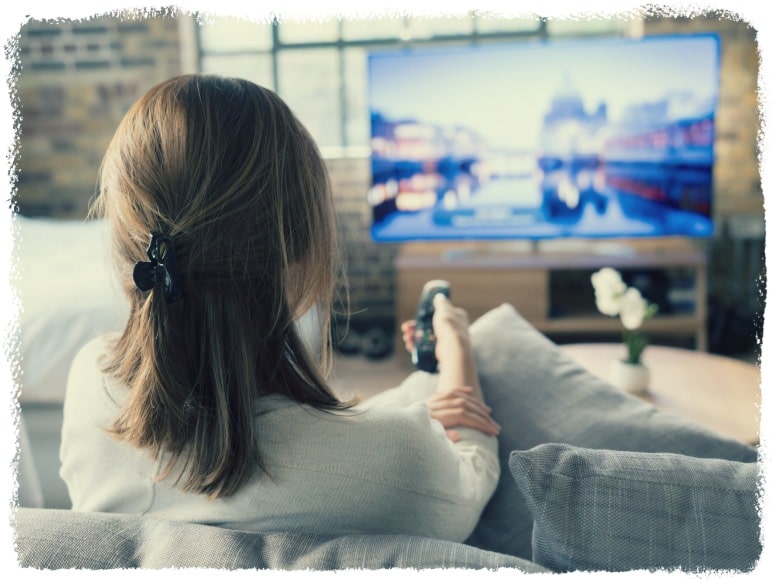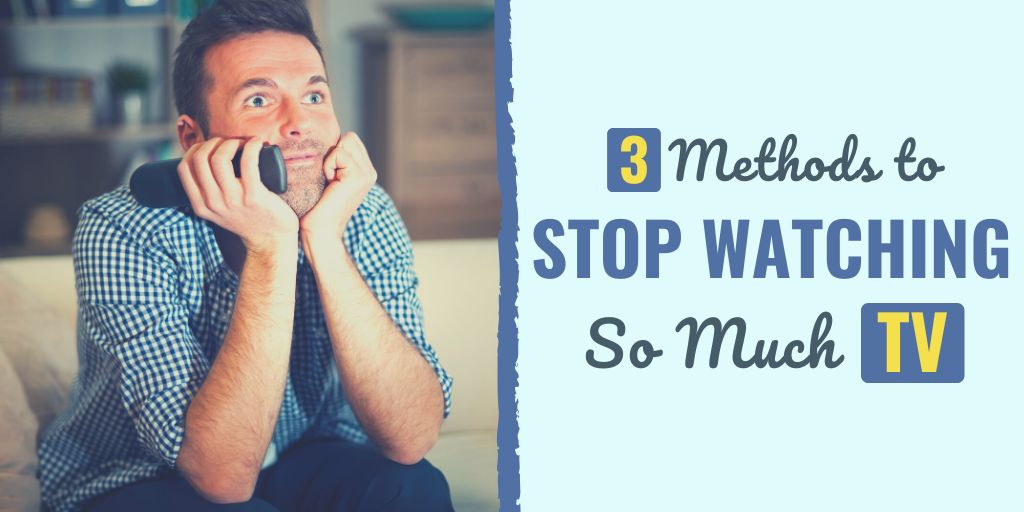There might be affiliate links on this page, which means we get a small commission of anything you buy. As an Amazon Associate we earn from qualifying purchases. Please do your own research before making any online purchase.
Watching TV has become a normal part of everyday life. Although not everyone around the world can enjoy this technology, those who do seem to be enjoying it too much.
According to data released by Nielsen in 2016, American adults watch an average of 5 hours and 4 minutes of television per day.
The habit of watching TV starts at a young age. And unfortunately, in some households, the TV has become the unofficial nanny, keeping young kids glued to it while parents do chores and work.
If you’re ready to use your time better, we will cover three common approaches to stop watching TV. But first, let’s talk about seven good reasons you should cut the cord (or at least minimize your TV time.)
Let's get to it…
7 Reasons to Stop Watching TV
By choosing to stop (or reduce) watching TV, you can…
1. Increase productivity.
Once you stop wasting time watching TV, you can focus on your work and/or business. You'll instantly gain back several hours each day to work on tasks that will help you move closer to your final goal, whatever that may be.
By freeing up an average of 5 hours and 4 minutes per day, think of everything that you could get done. You could write an entire book in a month, or become a better version of yourself by learning new skills. Time spent watching TV is equivalent to being asleep, and no one is productive in their sleep.
2. Strengthen social relationships.
If you're not wasting so much time sitting in front of the television, you can instead spend that time with your family and friends, and actually talk. You can build more meaningful relationships by communicating about what is going on in each other's lives or what is going on in the world.
You can learn about other people's opinions on things, and have beneficial discussions. Connection is a basic human need that everyone has, and it will never be satisfied by your television.
3. Think clearer and sharper.
Watching TV slows down your brain activity because of poor content, subliminal programming, and advertising. It fills your head with negative messages, creates unrealistic expectations, and makes you think that your life is inadequate.
Once you stop participating in this passive activity, you will start using your brain more and build the neural pathways you need to continue to progress in life through learning.
4. Develop a healthier self-esteem.
Many TV shows send the wrong message about self-love, happiness, and success, and create unrealistic expectations. Television shows are filled with very attractive people going on amazing adventures or doing exciting things.
It is not always easy to remind yourself that these images and situations are staged, and that they are not actual real life. Watching TV can make people feel disillusioned with their real lives, which may feel empty when compared to those on television.
TV can also put false beliefs in people's minds regarding what is actually possible to accomplish. When these lavish accomplishments aren't met, people become disappointed.
5. Live healthier.
Watching TV gets you stuck in a sedentary lifestyle because it’s often done while sitting. Our society already lives a more sedentary life than generations that came before us due to the fact that many people work while sitting at desks all day.
Going home from work and watching television only makes this problem worse. Sitting all day has been linked to a decline in mental health, an increase in weight gain, and a higher risk of dying from heart disease or other chronic illnesses.

You’re also more likely to overeat while you’re sitting in front of the television, mindlessly snacking on junk food. And, because you’re burning fewer calories since you are getting no physical activity, this is even more risky for your health.
6. Save money.
Canceling cable subscriptions can save you money, and lower your electricity bill too. Cable subscriptions certainly aren't cheap, and if you can cut that one bill every month, you will have that much more money in your pocket to spend on more meaningful activities.
Also, television is constantly exposing you to advertisements that make you feel like you need to make unnecessary purchases to either improve yourself or better your life. Television is designed to make you feel poorly about yourself so you will buy whatever they are selling to fix the problem that advertisers are leading you to believe that you have.
The truth is, you probably don't have the problem in the first place. Even if you’re not watching TV with shopping in mind, what you see can still negatively influence your spending. We are visual beings, and are easily influenced by TV even without realizing it.
7. Become better role models to children.
Kids learn from their parents, and they are now being trained to live sedentary lives by spending their time in front of the television. If they grow up seeing you addicted to TV, they’ll emulate you.
Research has shown the negative effects that television has on children, both because of its influence and because it prevents them from being active.
In fact, the American Academy of Pediatrics recommends that children who are under two years old watch absolutely no TV, and those children older than two watch under two hours of high-quality programming per day.
From birth to two years old is a critical time for children's brains to develop, and television can hinder children from exploring, playing, and having important social interactions that encourage learning and healthy development.
3 Methods to Stop Watching So Much TV

1. Wean yourself off of TV.
By decreasing the amount of time you spend watching TV instead of going cold turkey, you're giving yourself time to adjust. You can start this by being very selective about what you choose to watch.
One of the reasons that you may want to stop watching television is that the programs that come on aren't any good in the first place. If this is the case, don't replace what is airing on TV with other videos like reruns of shows you have seen before or programs that you don't truly enjoy.
Instead, when you do choose to watch TV, try to find something that is worth your time. Watch a show that will teach you something, or watch some classic movies. Increase your standards.
As you do watch these more purposeful shows, keep a record of how much time you are spending in front of the TV. Commit to reducing the number of hours each week, and use a timer if you need to so you can keep track of how long you have been watching.
If you know you only have a set amount of time to watch TV, you will be more likely to enjoy it and watch something that is actually worth your time.
Another part of watching TV with good intentions is to not start watching new shows. When you're trapped in a world of television, everything may start to seem like something you need to watch. Friends may breathlessly tell you how great a new series is and invite you over to start watching it with them.
You can get hooked on the “next best show” out there that everyone is talking about in the office, but if you don't even watch the first episode, you will have no interest in the conversation.
As time goes by, you’ll notice that you either stop watching TV completely, or only watch very specific things that don’t eat up a lot of your time.
Weaning off of TV may also involve dedicating a place and a time for it, and sticking to your rules. Designate “screen-free” areas of your house, such as the kitchen, dining room, and bedroom.
Applying a complete screen ban to these areas will prevent you from watching TV on your smartphone, DVD player, etc. as a substitute. Additionally, you can designate a specific day for TV watching.
If you don’t want to completely stop watching TV, choose a day and specify the number of hours that you can watch TV. You can even use it as a reward for yourself if you stick to the rules.
2. Completely stop watching TV.
Quitting cold turkey is not for everybody, but if you’re dedicated to making a positive change, this might be the right way for you. This will be difficult at first, especially if you tend to turn the television on out of habit and keep it running in the background. But it will get easier as time goes on.
Start by cutting off your access to TV. Cancel your cable TV subscription and your online streaming subscriptions. Remove the TVs from your home and the apps on your phone that you usually watch videos on.
Sell, donate, or give anything away that you can. Get rid of any temptations to watch TV or any reminders that television is an option for a pastime.
Replace this activity with spending time with like-minded people who don’t watch TV either, and socialize with them. This will help take away the temptation to watch television, and it will also help you get accustomed to living like other people who avoid watching television.
It won't take long for you to pick up on the more positive hobbies they enjoy and start adopting this new lifestyle.
To keep your mind off of television shows, make sure to unfollow social media accounts and other online platforms that are dedicated to TV shows.
Since you are no longer watching TV, you don't need to keep up with the latest gossip or news about the characters on the show—whether it is the real life of the actor or actress playing the character or their storyline in the plot of the show. In fact, you need to stop watching the news.

3. Substitute with a healthy habit.
Another approach is to replace watching TV with other healthier activities. It’s not that difficult to find other things to do instead of watching TV. (Like check out the Morning Brew newsletter.)
Instead of wasting your time in front of the television, start a side project—something not related to your work.
This can help you stay productive while you are not working, but still get your mind off of the subject of your career. Think about things you enjoy doing, whether that is writing a book or building a shed in your backyard.
If you want to do something on a smaller scale, find a new hobby. Spending time on hobbies can help you truly relax and explore your talents.
The good thing about hobbies is that if one doesn't stick, you can easily move on to another. You don't have to put a huge investment of time or money into a hobby until you are ready.
You can also use your free time to learn something new. There are many skills that you can learn by yourself that will give you lasting benefits.
Learning something new will give you something to talk about with your friends who also avoid watching TV. It will also expose you to new things and help expand your mind, set a positive example for your children, and give you some power in your life.
If you want to master a new skill or topic quickly, then the key is to only focus on the information that can be immediately applied. Watch the video below to understand the concept of just-in-time learning.
In addition to teaching yourself new skills, you can also attend a class that interests you. This will help you learn alongside other people who share your interests. Attending a class will help you overcome boredom, cultivate substantial conversations, and impact the lives of other people in a positive way.
Volunteering is another productive way to spend your free time that will positively impact the lives of others. Oftentimes, organizations will value your volunteered time even more than your money, so offering your help can be a priceless way to pitch in to the community.
Look into local nursing homes, soup kitchens, or children's hospitals to see what kind of volunteer opportunities are available. Doing any kind of volunteer work will be much more rewarding than spending a day in front of the television.
Final Thoughts on How to Stop Watching So Much TV
TV isn’t bad, per se, but if you spend too much of your time watching it, you’re not living at all.
Give yourself the chance to enjoy other things and actually experience them yourself rather than just watching other people experience them on TV. Choose which one of the approaches mentioned above best fits your situation and commit to trying to stop watching too much TV.
Once you find yourself with a little more extra time, we can use it to create positive habits that add value to your daily existence. If you're really serious about changing your habits, this article explores if successful people watch TV might interest you.
Finally, if you want to level up your productivity and time management skills, then watch this free video about the 9 productivity habits you can build at work.



I come from a long line of TV watchers. My dad watches TV from afternoon to bedtime, and my husband and I had developed the habit of doing the same thing, which was so frustrating.
We got rid of our cable, but we just found a way to borrow cable online from family. We tried taking the TV out of the bedroom (where we watched a lot of Supernatural before bed), but we just watched in the living room instead.
We found it really imperative to get in the mindsets of ‘We have much better things to do than watch TV’ and ‘We don’t need TV in our lives’. Once we adopted the right mindset it was so much easier to back away from the TV and do other things.
RIght on!
It is not an easy thing to do these days, with so much good programming on places like Netflix. But this also makes it more important from the productivity point of view -since there is always something “great” to watch.